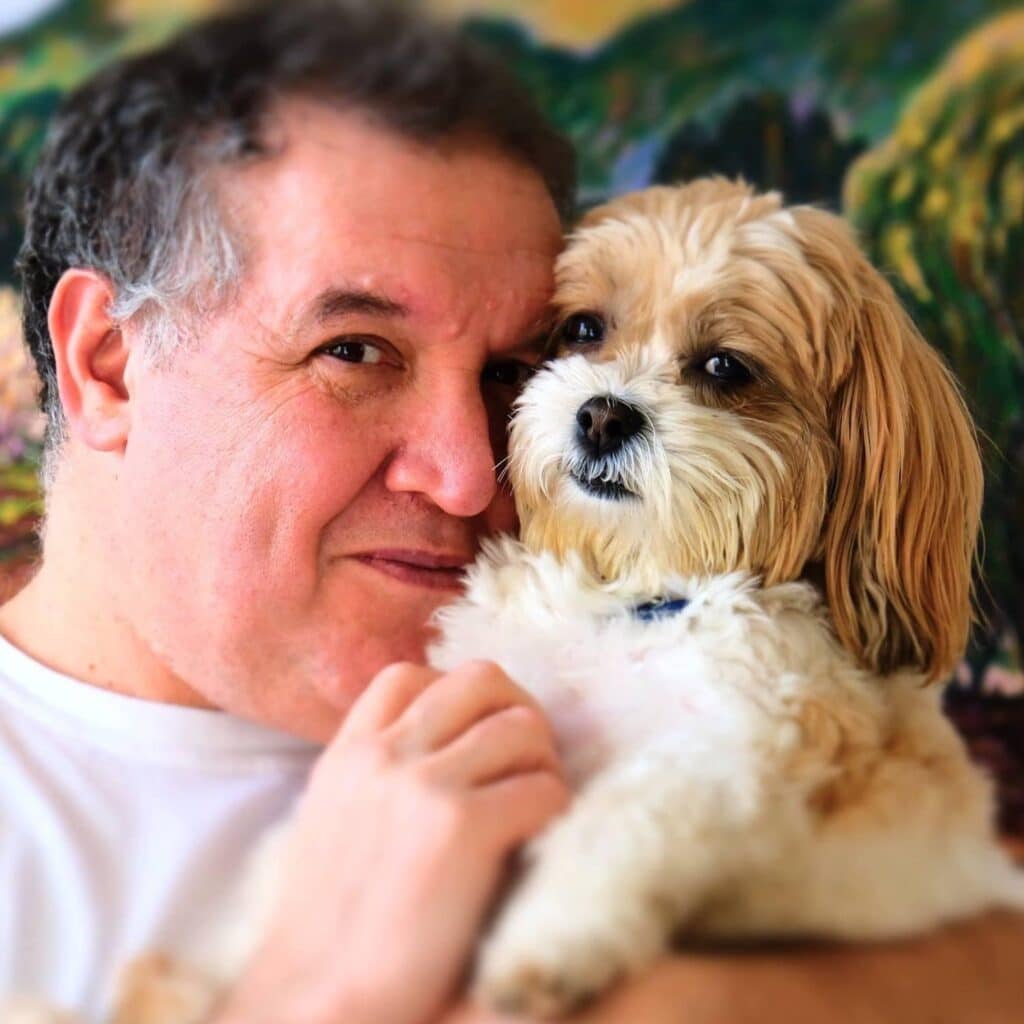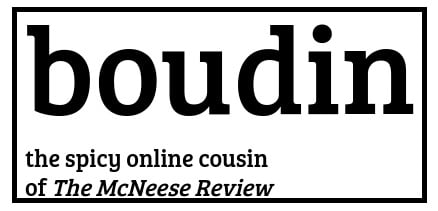Dread
Randall Brown
__________
Attie shone the iPhone’s flashlight in her sister Isabel’s face and, with her left hand, knocked her awake. It had been only six hours since their dog Lucky returned after a week, mad, foaming, stumbling through the gates and into their seven acres on the Philadelphia’s Main Line. Lucky’s sickness still clung to the air, like the scratch of rats.
“There’s something we must do.” She shook Isabel. Their mother had screamed for her daughters to run, Isabel immediately sprinting. But Attie had stood her ground, stepped in front.
Isabel buried her head in her pillow. “Leave me alone.” The dog had lunged past Attie, buried its teeth in her mother’s neck, crushing the trachea. Attie now flipped Isabel back into the light. “What?” Isabel asked. “What do we need to do?”
Attie felt the deadness of her sister, that part that had grown sick of it all. “Dad left the dog outside the fence. To rot, he said.” From behind the sliding glass doors, Isabel had watched the attack, paralyzed. “And he said Lucky has to stay like that, unlooked at and untouched.”
“Why would you want to touch it?”
“We have to bury it,” Attie said. “He’s ours. Our dog. Not his.” Their mother now lay at Bryn Mawr Hospital, a ghost but holding on.
The television downstairs stayed on, the voice like iron, announcing the latest sickness, another reason not to exist. “I’m not touching that thing.”
“How about the shovel? Certainly, you aren’t afraid of that.”
“You and your death wish,” Isabel answered. “Dad doesn’t need you—”
Attie cut her off. “I don’t care what he needs.” She strode out to the forest, now fully engaged.
*
Outside, the yellow leaves dripped with the sodden air. The woods felt once-removed, obscured and dim. Attie touched the slick trunk of the birch trees, the bark crumbling like plaster off a neglected house. The wooden gate wouldn’t yield to her pushing, until finally she kicked it off its hinges and it hung there, like a broken tooth.
Lucky wasn’t there. Had he recovered? Been moved? By whom? Or what? She called his name, quietly, her steps sinking into the undergrowth, stumbling over the hidden roots on her way up the tangled hill of her backyard.
“Dad isn’t—” Her sister’s voice called from below but lost its sense before it reached Attie. Dad isn’t. That said it all. He would exile her this time. For good.
She heard a rustling ahead, behind the insurgent bamboo. She crawled to the edge. A dark form bent over the body of her dog, the dog who knew her every feeling, who’d arrived to save her after her return from the hospital, curling his body tight against her when she needed that warmth and connection, running ahead of her to push her to follow when she needed flight, planting himself on her chest when she wanted to be buried in fur.
“That should seal it.” The form moved out of the shadow, into a slant of moonlight. In his left hand, a knife caught the light, reflected it into Attie’s vision, blinding her.
“Dad?”
The form looked up, stepped toward her. “What were you doing in your sister’s room?”
“Isabel’s?” The unexpected question diverted her from her purpose.
“I saw the light.” He looked to the window. “You said you wouldn’t involve her in your—well, in your what? You tell me.” He moved out of the moon’s reflection, the last bit of light catching the glint of blade. “You wanted us to stop hovering, to stop spying, to stop caring. Remember all that?”
“I wanted Isabel’s help. To bury Lucky.”
“You want. You think that defines this family?—all that you want?”
“No.” Yes, she’d swallowed the twenty-three—and yes, she counted them twenty, thirty times—oval Xanax pills. She’d lost her mind. For just that one moment. “He’s mine.”
That knife. Had he slit Lucky’s throat? Out of anger? Mercy? When she’d put her body between Lucky and her mother, what had she hoped for? Choose me, Lucky, just once, someone choose me. But not for death, no. For something else.
“You killed him,” she accused. “How could you?”
“Me?” Her father stepped toward her. “You think this is my fault? You think your mom could let you alone for a second without dying of worry? With all you don’t know, I could fill a world.”
“I stepped in front of her. Where were you?”
“The mad dog. That’s who you stepped in front of. Take me, World!”
A noise from behind him—a hum. A tail hung in the moonlight, stiff and still. She pushed past him to get to Lucky, to give him back to nature, to bury him in the earth’s womb.
“Oh my God.” She sank to her knees. “You think that would replace him?” Its gut lay open, the red wires spilling out like uncoiling snakes in a garden.
“Replace him?” He stood over her now. “Do you know how much this cost us?”
She said nothing, instead pet the faux-fur. Out its ear, a small transistor—a hearing aid?—crackled with leftover life. As she reached for it, her dad stepped on it, crushing it against a half-buried rock.
Its significance remained outside Attie’s understanding, so she didn’t recognize it as a microphone, saw it instead only as her father’s way of finally bringing this—not dog, but what?—to its death. The dog was something unreal, something they tricked her with, a thing pretending to love her, a thing to convince her the world was worth her time. It was for them, like everything else.
He continued talking, something about Mom’s need to know, about a bug, machines, madness.
He kneeled next to her. She didn’t hesitate. With her right hand, she reached for her dad’s knife, stuck the blade in his belly, stuffed in her left hand, the fingers frantic, like escaped vermin, searching for wires.
__________
Dedication
The dog in “Dread” is nothing like Hazel, a real beauty of a being.

__________
Randall Brown is the author of the award-winning collection Mad to Live, his essay on (very) short fiction appears in The Rose Metal Press Field Guide to Writing Flash Fiction, and he appears in Best Small Fictions 2015, 2017, & 2019 and The Norton Anthologies Flash Fiction: America and New Micro: Exceptionally Short Fiction & Hint Fiction; also, his essays appeared in Grey House’s Critical Insights: American Short Story and Critical Insights: Flash Fiction. He founded and directs FlashFiction.net and has been published and anthologized widely, both online and in print. Recent books include the flash fiction collection This Is How He Learned to Love (Sonders Press 2019), the prose poetry collection I Might Never Learn (Finishing Line Press 2018) and the novella How Long is Forever (Running Wild Press 2018). He served as the Director for the MFA in Creative Writing Program at Rosemont College, as a reader, editor, and Lead Editor at Smokelong Quarterly, and as a judge for numerous flash fiction awards, including Rose Metal Press’ annual chapbook contest. He is also the founder and managing editor of Matter Press and its Journal of Compressed Creative Arts. He received his MFA in Fiction from Vermont College.
__________

To learn more about submitting your work to Boudin or applying to McNeese State University’s Creative Writing MFA program, please visit Submissions for details.
Posted in Boudin April '24 Pet and tagged in #boudin, #fiction
